TODAY’S READING- HEARTS TESTED- CONTAGIOUS MURMUR DETECTED; THE SHEPHERD BETRAYED; THE SHEEP SCATTERED
NUMBERS 11- HEARTS ARE TESTED IN RELATIONSHIP TO CIRCUMSTANCES
In Chapter 11 “The Book of Numbers” becomes “The Book of Murmuring and Wandering” due to the unbelief that infects the multitude.
There are a number of references in the New Testament to the incidents that take place in these remaining chapters in the Book of Numbers. In the third chapter of Hebrews we read:
Hebrews 3:7-12: 7So, as the Holy Spirit says: “Today, if you hear his voice, 8 do not harden your hearts as you did in the rebellion, during the time of testing in the desert, 9 where your fathers tested and tried me and for forty years saw what I did. 10 That is why I was angry with that generation, and I said, ‘Their hearts are always going astray, and they have not known my ways.’ 11 So I declared on oath in my anger, ‘They shall never enter my rest.’ 12 See to it, brothers, that none of you has a sinful, unbelieving heart that turns away from the living God. Hebrews 3:7-12 (NIV) 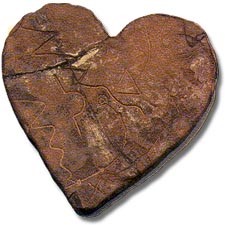
How did the people of Israel, the covenant people of God, become an example of the state of hardened unbelieving hearts so quickly after being examples of believing hearts? How did the hearts of those who had seen miracles at the hand of God get so quickly deceived into the state of unbelief?
First, there were “those in the camp who complained of adversity” (Numbers 11:1).
They were known to be “complainers”. They complained when conditions were difficult. They complained when their patience was being tried. Their patterns of thought and speech, their character and overall demeanor had become known during the first year of the journey. Three days after the Red Sea parted and they crossed over on dry ground, a clear manifestation that God was their Deliverer, they complained about the lack of water on the other side. And now, three days after setting out from Sinai, they are complaining again.
While Moses took his complaints about the people to the Lord, these discontents complained about the Lord to the people.
Secondly, many people were becoming like them. Negativity is contagious. Those who grumble will tumble and their dread will spread. This is clarified in the NASB translation.
Now the people BECAME LIKE those who complain of adversity in the hearing of the LORD (Numbers 11:1; NASB).
Thirdly, there was “the rabble (mixed multitude) among them who had greedy desires”.
The Hebrew word “asapsup”, translated “rabble”, is only found in this instance in the Old Testament. Earlier translations of this word are “mixed multitude”. Other versions translate it as the “foreign rabble”, because it specifically refers to those Egyptians who joined the Israelites in their Exodus after the last plague.
In the Book of Exodus, Chapter 12, verse 38, we learned of these people.
38 A mixed multitude also went up with them, along with flocks and herds, a very large number of livestock. Exodus 12:38 (NASB)
Perhaps they were welcomed into the congregation because of their wealth. They had a very large number of livestock. They received the good news of the Promised Land with joy and were delighted to pass through the Red Sea and witness the mighty hand of God. Yet there was no foundational recognition of their need for the Passover Lamb.
The mixed multitude was of mixed faith.
It is most likely that they did not personally apply faith in God’s Word about the necessary application of the blood of the spotless lamb to the doorposts of their home on the evening of the Passover. Perhaps they had no firstborn sons to lose. Or maybe they joined themselves to the Israelites as a means of protection against future disaster.
Perhaps they joined the exodus because they saw it as a “quick fix” for their problems. These were Egyptian residents who saw the Israelites being blessed in the land of Goshen and understood that they were now on their way to a land of abundant opportunity, a land their God promised to be flowing with milk and honey.
But in the barren wilderness of Sinai the promise of fertile fields and abundant crops were soon discounted as “unreal”. Their greedy desires were not being fulfilled. Instead of talking about Canaan, they would talk about home. It was in Egypt, not in Canaan that their desires would be satisfied.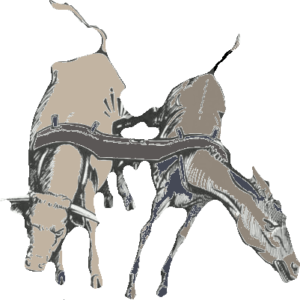
In Jesus’ Parable of the Wheat and the Tares we are told of the reality of mixed multitudes. The Apostle Paul warns us not to sympathize with their carnal and worldly desires, and their preference for what they had in their old life instead of what God has promised in the new.
Do not be bound together with unbelievers; for what partnership have righteousness and lawlessness, or what fellowship has light with darkness? 15 Or what harmony has Christ with Belial, or what has a believer in common with an unbeliever? 2 Corinthians 6:14-15 (NASB)
Paul applies the wisdom pertaining to mixture in Deuteronomy from which he draws the analogy of “an unequal yoke” and the call to unadulterated affections among the people of God.
9 “You shall not sow your vineyard with two kinds of seed, or all the produce of the seed which you have sown and the increase of the vineyard will become defiled. 10 “You shall not plow with an ox and a donkey together. 11 “You shall not wear a material mixed of wool and linen together. Deuteronomy 22:9-11 (NASB)
The mixed multitude now doubted God’s ability to bring them into the land. They saw no redemptive purpose in the trials, hardship, discipline or delays in the desert. “How could these be from God?”, they thought. Or if they were from God, He is being too hard on them. When God sent fire to the outskirts of the camp, instead of crying out to God in repentance, they cry out to Moses. 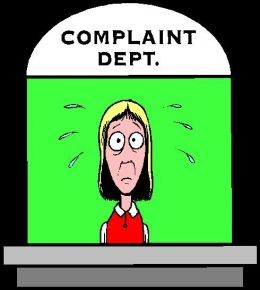
Fourthly, there were those who were ungrateful for the manna.
They were weepers. They wept at the doors of their tents. They cried out “Who will give us meat to eat?” They were discontent. Their appetite was for something other than what God had on the menu. They lost their taste for manna, although it was freshly, faithfully and miraculously provided by God to sustain them on their journey. They were weary of the bread from heaven.
So, God gives instruction to Moses:
18 “Say to the people, ‘Consecrate yourselves for tomorrow, and you shall eat meat; for you have wept in the ears of the LORD, saying, “Oh that someone would give us meat to eat! For we were well-off in Egypt.” Therefore, the LORD will give you meat and you shall eat. 19 ‘You shall eat, not one day, nor two days, nor five days, nor ten days, nor twenty days, 20 but a whole month, until it comes out of your nostrils and becomes loathsome to you; because you have rejected the LORD who is among you and have wept before Him, saying, “Why did we ever leave Egypt?” (Numbers 11:18-20)
When people have their fill of their greedy desires, they discover it is not what they truly needed or wanted.
Moses is already tired and weary. He is not weary of the manna. He is weary of the attitudes of the people.
We are vulnerable when we are discouraged and exhausted. Moses misinterprets God’s promise to give the multitudes meat as meaning added work for him! (Numbers 11:21-22). How can he prepare meat for all these people? His heart is growing cynical, doubting that God’s people would ever be satisfied, no matter what they were given.
The LORD responds to Moses, “Is the LORD’S power limited? Now you shall see whether My word will come true for you or not” (Numbers 11:23).
The Lord keeps His word and a wind brings in quail from the sea and it falls to the ground until some are waist deep in fresh meat. The people gathered it and cooked it, but those who ate it were sickened by it (Numbers 11:33).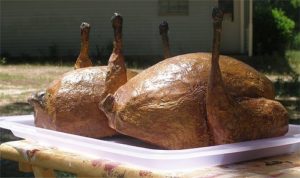
The place was named “Kibbroth-hattaavah” (THE GRAVES OF LUST) because there they buried the people who were greedy.
We see that God’s most severe judgments are often those in which the Lord leaves people to their own desires:
So He gave them their request, but sent a wasting disease among them. Psalm 106:15 (NASB)
24 Therefore God gave them over in the lusts of their hearts to impurity, so that their bodies would be dishonored among them. Romans 1:24 (NASB)
26 For this reason God gave them over to degrading passions; for their women exchanged the natural function for that which is unnatural, Romans 1:26 (NASB)
28 And just as they did not see fit to acknowledge God any longer, God gave them over to a depraved mind, to do those things which are not proper, Romans 1:28 (NASB).
These are judgments of abandonment.
The Lord makes it clear that in rejecting the manna, His people were rejecting Him (Numbers 11:20). In Exodus 16:4 and Deuteronomy 8:3, He had warned them that the manna would be a test as to whether their hearts would be filled with faith or unbelief.
4 Then the LORD said to Moses, “Behold, I will rain bread from heaven for you; and the people shall go out and gather a day’s portion every day, that I may test them, whether or not they will walk in My instruction. Exodus 16:4 (NASB)
3 “He humbled you and let you be hungry, and fed you with manna which you did not know, nor did your fathers know, that He might make you understand that man does not live by bread alone, but man lives by everything that proceeds out of the mouth of the LORD. Deuteronomy 8:3 (NASB)
NUMBERS 12- HEARTS ARE TESTED IN RELATIONSHIP TO THE WORD AND THOSE WHO SPEAK IT.
In our own wilderness journeys, our hearts are tested in relationship to the Word of God and those who speak it. 
This certainly happens in the Book of Numbers.
Moses speaks the Word of God. People, at first are happy to do what the Lord commands through the words He has given to Moses. As a result, people are made ready to journey and set out for the Promised Land.
The pressure of clarifying and communicating the Word of the Lord becomes more than Moses feels that he can personally bear. Therefore, the Sovereign Lord offers to spread that spiritual endowment for prophecy to seventy others. (Notice that the Bible does not indicate that spiritual gifts are transferred by laying on of hands. The Sovereign Spirit rests upon them). The Holy Spirit rests on 68 of them who are gathered with Moses around the tent. “And when the Spirit rested on them, they prophesied. But they did not do it again”. (Numbers 11:25)
Prophesy is a gift of the Spirit. But it also requires human cooperation. There are times that God can put His words in the mouth of a donkey, but His intention is to speak to man through man. He needs messengers for His message. But the messengers need to have hearts that are submitted to the Lord.
The hearts are again tested in regard to people prophesying in Numbers 11:26-29. Two of the seventy, Eldad and Medad, for some unknown reason, are not together with Moses by the Tabernacle when the group start to prophesy, speaking forth the Word of God. Yet the Spirit rests upon Eldad and Medad, and they too are given the gift of being able to prophesy. First, a young man protests, and then Joshua tells Moses to restrain them! (Numbers 11:28)
Moses rebukes Joshua, “Are you jealous for my sake? Would that ALL the Lord’s people were prophets, that the Lord would put His Spirit upon them!” (Numbers 11:29)
Moses had a vision of the Sovereign grace of the Lord and the privilege of being His spokesperson. The people needed to be encouraged with the Word of the Lord. Would that they all be able to encourage themselves and each other!
The Apostle Paul states a similar sentiment:
1 Pursue love, yet desire earnestly spiritual gifts, but especially that you may prophesy. 1 Corinthians 14:1 (NASB)
3 But one who prophesies speaks to men for edification and exhortation and consolation. 1 Corinthians 14:3 (NASB)
The situation reminds us of the disciples complaining to Jesus about another upon whom the Spirit was resting,
49 John answered and said, “Master, we saw someone casting out demons in Your name; and we tried to prevent him because he does not follow along with us.” 50 But Jesus said to him, “Do not hinder him; for he who is not against you is for you.” Luke 9:49-50 (NASB)
The tests in regard to prophesying continue.
Moses’ sister, Miriam, and his brother, Aaron, spoke out against him. First, they were upset with his marriage to a Cushite woman. Then they expressed resentment towards Moses being God’s designated spokesperson and they questioned his authority.
2 and they said, “Has the LORD indeed spoken only through Moses? Has He not spoken through us as well?” And the LORD heard it. Numbers 12:2 (NASB) 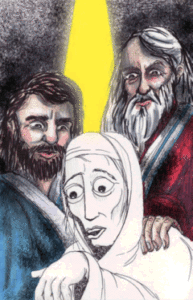
Let us be careful not to make too much of our own particular gifts and experiences. Instead let us recognize God’s authority as expressed through His Word.
The Lord said that Moses is more than a mouthpiece, he is a faithful servant. He knows me. He reverences my Word and beholds the form of the Lord in the Word (Numbers 12:7-8). (That commendation reappears in the Book of Hebrews!)
Miriam is chastised with leprosy and Moses intercedes for his beloved sister. The Lord took Miriam’s attack on Moses personally, because ultimately that is what it was.
As a result, Miriam was set aside as leprous for seven days and the entire camp of Israel had to wait until she was purified before they could resume their journey.
NUMBERS 13 – HEARTS ARE TESTED IN RELATIONSHIP TO THE PROMISES
Today’s Old Testament reading concludes with the sending out of the 12 spies into the land of Canaan. Representatives from each tribe are chosen. Joshua, of the tribe of Ephraim, and Caleb, of Judah, are among them. They are given a list of conditions to investigate and told to report back to the people.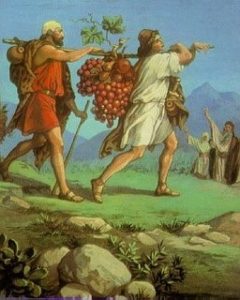
The twelve are gone for 40 days and then return, with ten of them giving an evil report.
The ten spies concurred that, yes, the land was as God said it would be. The land does flow with provisions for livestock and fruitfulness. They brought back astounding samples of fruit to prove this.
NEVERTHELESS, they said in a panic, the descendants of ANAK, and NEPHILIM are there.
The name “ANAK” means “long necked”. The Anakim were big people who stood tall in the eyes of others. While the ten saw these “long-necked” sons of Anak as a problem looming large, two spies, Joshua and Caleb, saw them as giant opportunities in work clothes! Long necks mean greater distance between shoulders and heads. A greater distance makes for a greater opportunity to separate the two. 
“NEPHILIM” refer to “giants”, but the root word, ‘naphal,’ means, “to fall down, or be cast down”. Whereas the ten spies saw the Nephilim as a giant obstacle, Joshua and Caleb went for the root interpretation! If God had called them to possess the land, indeed the Nephilim would ‘fall down’, or ‘be cast down’ before them.
The people favored the majority report that the obstacles in the Promised Land were insurmountable. They believed a lie that Canaan “is a land that devours its inhabitants”.
The ten spies confessed that the inhabitants of the land were too strong for them. Joshua and Caleb knew that although they might be too strong for them, they were not too strong for God.
How often we adopt the viewpoint that magnifies the enemy and minimizes the promises and power of God!
Notice how the negative report affected not only how the people saw the enemy but how they saw themselves!
33 “There also we saw the Nephilim (the sons of Anak are part of the Nephilim); and we became like grasshoppers in our own sight, and so we were in their sight.” Numbers 13:33 (NASB)
NEW TESTAMENT READING: Mark 14:22-52
After sharing the Passover meal with His disciples, Jesus proceeds from the upper room and outside the city walls to cross the Kidron valley to the Mount of Olives, where the Garden of Gethsemane is at its base.
The disciples had remembered the first Exodus in the celebration of the Passover meal and were about to experience the second and greater Exodus, a deliverance from their bondage to sin and death. The time had come for the Lamb to be taken away and slain.
Jesus prophesies and interprets a prophecy that was written hundreds of years earlier by Zechariah (Zechariah 13:7):
27 And Jesus said to them, “You will all fall away, because it is written, ‘I WILL STRIKE DOWN THE SHEPHERD, AND THE SHEEP SHALL BE SCATTERED.’ (Mark 14:27; NASB)
In addition to prophesying that the disciples would scatter in fear, Jesus again prophesies His resurrection and what would happen after the resurrection.
28 “But after I have been raised, I will go ahead of you to Galilee.” Mark 14:28 (NASB) 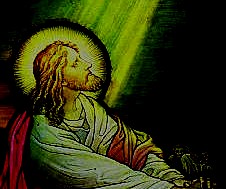
Jesus’ prayer in Gethsemane is one in which He wrestles through all his human feelings that would resist His obedience. It was time for Him to be sacrificed for us as the Passover Lamb (1 Corinthians 5:7). He knew this. It was the hour for which He had come.
Mark summarizes,
35 And He went a little beyond them, and fell to the ground and began to pray that if it were possible, the hour might pass Him by. Mark 14:35 (NASB)
Jesus relentlessly surrenders His will to that of the Father, knowing it meant death by crucifixion.
Jesus’ intercession ends with a resolve: “The hour has come. Behold, the Son of man is being betrayed into the hands of sinners.” (Mark 14:36).
It seems likely that Mark is drawing from Peter as a source eye-witness in this Gospel. Peter is in almost every scene. Mark kindly does not mention that it was Peter who cut off Malchus’ ear with a sword when the entourage of the priests came with swords and clubs to arrest Jesus (See John 18:10). But then Mark adds a detail overlooked by the other gospel writers and one that would likely have escaped Peter’s attention, that of a young boy wearing nothing but a nightshirt over his naked body. By this time Peter and all the others had fled. But the boy followed Jesus. The report continues that he was seized by the authorities. The boy managed to escape by breaking free from his nightshirt and running away naked. This information must have come from another source other than Peter. Perhaps the boy was Mark himself? Many believe that the Last Supper was held in Mark’s mother’s home and that Mark, unwilling to sleep when Jesus left for the outdoors, followed Him to Gethsemane.
READING IN PSALMS
Psalm 52:1-9;
This Psalm, we are told, is about the incidents described in 1 Samuel 21 and 22 when Doeg, the Edomite, King Saul’s chief herdsman, demonstrated his true wickedness by betraying David to King Saul, reporting to Saul that Ahimelech had served food to David and given David Goliath’s sword.
Verses 1-4 describe Doeg’s true character. Verses 5-7 describe his doom and verses 8 and 9 contrast the nature of Doeg with that of a worshiper who has been made right with God through faith in the gospel promise.
There is great application to our own lives. We have inherited ‘the Doeg nature of sin’. Verse 1-4 could well describe the characteristics of the sin nature within us.
Psalm 52:3 3 You love evil more than good, Falsehood more than speaking what is right..
In verses 5-7 we see what that sin nature deserves as punishment. The sin nature “uproots us from the land of the living” (v.5). In contrast to this we see the blessed impact of being justified by faith in Christ. “As for me, I am like a green olive tree in the house of the Lord” (v.8) having put my trust in the lovingkindness of God in the gospel (v.8).
In describing his heart of gratitude, David gives us words that describe the attitude of one who has been made right with God through the finished work of Christ on the cross.
Psalm 52:9 (NIV) 9 I will praise you forever for what you have done; in your name I will hope, for your name is good. I will praise you in the presence of your saints.
Let us exalt His Name together!
TODAY’S READING FROM PROVERBS
Proverbs 11:1-3 (NASB) 1 A false balance is an abomination to the LORD, But a just weight is His delight. 2 When pride comes, then comes dishonor, But with the humble is wisdom.
3 The integrity of the upright will guide them, But the crookedness of the treacherous will destroy them.
We must love justice and fairness if we are to live a life that is well-pleasing to the Lord. Practice doing what you say you will do- INTEGRITY. Do the right thing. It is wise to be humble. Remember all that you are without Christ and you have a lot to be humble about! Without Him you are nothing and have nothing about which to boast. In Him you have God’s perfect provision. With the humble who put their trust in Christ is God’s perfect provision of wisdom, righteousness, sanctification and redemption (1 Corinthians 1:30).
PRAY FOR THE NATIONS
BENIN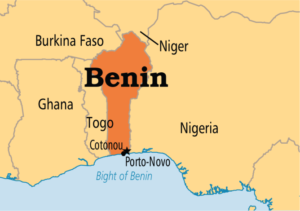
Geography
Area: 112,622 sq. km
A long, narrow country wedged between Nigeria and Togo.
Population: 9,211,741 Annual Growth: 3.20%
Capital: Porto-Novo
Urbanites: 42%
HDI Rank: 161 of 182 (UN Human Development Reports 2009)
Challenges for Prayer
Economic advancement and endemic corruption. Genuine efforts to uplift the economy too often fail because of corruption; as a result, Benin remains one of the world’s 20 least-developed countries. Up to 70% of the skilled workforce must subsist by taking manual or menial-labor jobs. Pray that those in positions to enrich themselves at the nation’s cost might instead be honest and self-sacrificing workers and leaders.
Less-reached peoples. Most peoples are still considered unreached – only a handful of smaller peoples have a Christian (Catholic) majority. Benin has Africa’s highest percentage of followers of traditional religions and is probably the least evangelized non-Muslim country in Africa. For specific prayer:
- The Fon are the most numerous people in Benin. It was from Fon animism that voodoo developed. The Fon have a significant Christian population, but many are nominal and voodoo still permeates their lives. Outreach by several Western and African missions birthed a large number of churches, as growth and responsiveness are found in equal measure. Pray for more Fon Christian leaders, and for believers untainted by animistic influences.
- The Gbe include 19 southern peoples from the Kwa/Guinean grouping, forming a patchwork of unreached and unevangelized peoples – accounting for 59.5% of Benin’s population. Among most of these peoples, indigenous evangelical churches are few, but growth is occurring.
- The Ede Nago are located on the southeastern border with Nigeria, in the region of Ketou. Until recently, they had little real exposure to the gospel and have no Scripture in their tongue. Related to them are the Idacca who live in south central Benin and are over 90% animist. There are now teams working among them.
- Muslim peoples. Most reside in the less evangelized far northern part of the country. They include the Dendi, Zerma, Hausa, Foodo and Kotokoli. Only the Zerma and Hausa have the whole Bible, and neither is more than 1% evangelical. Pray for teams to reach them –SIM, AoG and IMB all target specific peoples.
- The Fulbe (Fula) peoples of the far north have experienced a real breakthrough, with several thousand coming to Christ through Western (SIM, AoG) and indigenous ministries. There is a Bible school and a growing number of radio programs for the Fula, and their receptivity to the gospel continues.
- f)The 1.3 million urbanites of the two capitals. Rapid urbanization brings many from unevangelized peoples into the cities, including a quickly growing Muslim population. Teams are needed to specifically reach these groups in their new urban context; pray for awareness of the cultural differences among peoples and how best to reach each one. Nigerian missions and a number of Benin-originated churches are doing urban evangelism in several cities.
PRAYER: Lord, we are reminded of Your devotion to the Father, and Your sacrificial love for us. We thank You for the cross upon which You died and paid our ransom. We have been set free and are so grateful. Thank You for the gift of Your Holy Spirit and His enabling power to deny ungodliness and love righteousness. Help us to walk with You and live a life of integrity. In Jesus’ Name. Amen
Pastor David
So, naturally, we proclaim Christ! We warn everyone we meet, and we teach everyone we can, all that we know about him, so that, if possible, we may bring every man up to his full maturity in Christ. (Colossians 1:28, J.B. Phillips paraphrase)
New Life Community Church, Concord, MA 10742
www.newlife.org
Meeting Sundays at 10:30 AM at the New Life Ministry Center, 221 Baker Ave, Concord, MA
